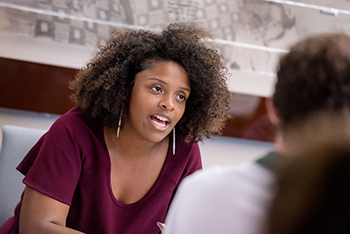
Kevyanna Rawls
Fresh off of USC Shoah Foundation’s Intercollegiate Diversity Congress (IDC) Summit, Memphis University Student Body Vice President Kevyanna Rawls has some new expectations for her school. With testimony clips and other USC Shoah Foundation educational resources gleaned from the Summit, she’ll have plenty with which to make an impact.
Rawls attended the IDC Summit after first hearing USC Shoah Foundation Senior Director of Programs and Operations Kori Street’s keynote presentation at the National Campus Leadership Council’s Presidential Leadership Summit in Washington, D.C. in June.
“While at the conference, we learned many skills that we could apply to our daily lives and to making improvements on our respective campuses,” Rawls said. “At the conference, we had the opportunity to hear a representative from USC Shoah Foundation come and tell us about what they did.”
There, Street gave an introduction to the assets USC Shoah Foundation had developed for students leaders– specifically, genocide survivor testimony clips and associated activities, to encourage diversity and inclusion on campus. She also encouraged attendees to participate in USC Shoah Foundation’s first-ever IDC Summit at USC in October.
“I never thought that I would have the opportunity to be a part of something like IDC,” Rawls said. But the storytelling aspect of USC Shoah Foundation’s mission intrigued her. “From a young age, I remember wanting to hear stories. In fifth grade, I interviewed many of my relatives and asked them to tell me the memories that they had associated with racism, segregation and integration...I loved hearing people tell me their stories and trying to understand what events led them to becoming the person they are today.”
At the IDC Summit, the 20 participants – student leaders from universities across the country – learned about the Visual History Archive, IWitness and strategies for using testimony to promote tolerance and inclusion on their campuses. They also learned how to construct their own activities in IWitness, and had dinner with Yannick Tona, a child survivor of the Rwandan Tutsi Genocide who is now a motivational speaker in the United States.
“With their mission specifically designed to tell the stories of survivors and let their voices echo on forever, I felt as though I had to be a part of the inaugural class of leaders within the IDC,” Rawls said.
Over the course of two days, Rawls and other attendees studied the role that storytelling plays on the general perspectives of an issue, interacted with the Institute’s New Dimensions in Testimony project, and had open conversations with other student leaders about how the testimonies within the Visual History Archive could be used in talking about the issues on their campuses.
“We took all of this information and began creating real ways that we could use the power of storytelling to transform our campuses and focus on the issues that need to be brought to the forefront,” Rawls said. “Through this planning time, we were able to share ideas with each other and devise plans for making sure that all of our ideas were realistic and relevant.”
Because no two schools had the same exact issues, Rawls said seeing the collaboration in developing solutions was heartening. With some help, she was able to identify several ways to introduce USC Shoah Foundation’s tools to her university.
“I learned that although storytelling is an intimate form of communication, it can create a space where people feel important and humanize the issues that have only been presented as statistics up until that point,” Rawls said. “I hope to bring the storytelling back to my university, to use the tools I learned at the Summit to present the impacts of issues like sexual assault and lack of necessary resources to administrators in a way that humanizes those impacted without isolating them and making them feel as though they don’t have a safe place.”
Though it might take some time to get the rest of the student government on board to further develop these ideas, Rawls believes the Memphis student body will gain a lot from testimonies’ lessons about tolerance, respect and inclusion.
“Events like the Summit afford students like me who have a genuine love for storytelling the opportunity to see the advantage of storytelling and how something that may be only perceived as a hobby is actually necessary,” Rawls said. “I cannot wait to see what we all go off to do and how we use the Summit’s tools to create our own stories.”